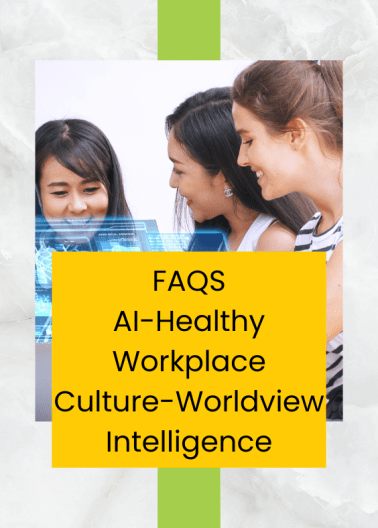Artificial Intelligence + Healthy Workplace Culture + Worldviews
These are the Frequently Asked Questions we receive about the impact of artificial intelligence on Workplace Culture and the role worldviews and Worldview Intelligence play. Let us know if you have additional questions.

1. How does AI affect workplace culture?
AI can reshape roles, workflows, and decision-making. Without clear communication and alignment, it can also create uncertainty, resistance, or mistrust. Workplace culture determines whether AI adoption feels like an opportunity or a threat.
2. Why do worldviews matter when introducing AI?
People’s worldviews shape how they perceive AI – some see it as innovative and empowering, others as risky or dehumanizing. Recognizing these differences in worldviews helps leaders address concerns, build trust, and create shared understanding.
3. What is Worldview Intelligence and how does it apply to AI?
Worldview Intelligence is a set of skills, knowledge and frameworks for understanding and working across different worldview perspectives. In the AI context, it helps organizations explore beliefs about technology, the future of work, ethics, and human value – making conversations more inclusive and productive.
4. What are the risks in ignoring workplace culture and worldviews when adopting AI?
Ignoring them can lead to disengagement, resistance, silos, and ethical blind spots. People may resist adoption or use AI in ways that conflict with organizational values, creating inconsistent or even harmful outcomes.
5. How can leaders use Worldview Intelligence to introduce AI successfully?
By:
• Listening deeply to different perspectives on AI’s role.
• Making space for questions, fears, and ethical concerns.
• Aligning AI adoption with shared organizational values and cultural strengths.
• Ensuring that worldviews and Worldview Intelligence inform AI policy, created by a cross-functional team.
6. Can AI improve workplace culture?
Yes – if implemented intentionally. AI can automate routine work, giving people more time for creative and strategic tasks, improve access to information, and enable better decision-making. But these benefits only materialize in workplace cultures that prioritize transparency, fairness, and human well-being.
7. How do you balance efficiency gains from AI with human connection?
A healthy workplace culture sets boundaries around AI use, ensuring it supports – not replaces – human judgment, empathy, and relationship-building.
8. What role does ethics play in AI and workplace culture?
Ethical considerations – bias, privacy, accountability – are tied to both organizational values and individual worldviews. Addressing them openly builds trust and strengthens the culture.
9. How can we measure whether AI is have a positive or negative effect on workplace culture?
Track both quantitative metrics (productivity, engagement scores, retention) and qualitative feedback (team sentiment, trust levels, inclusivity of AI use). Use Worldview Intelligence to interpret why certain reactions are emerging.
10. What's the long-term AI impact on workplace culture?
It depends on how it’s introduced and governed. Organizations that integrate AI with respect for diverse perspectives and a commitment to a healthy workplace culture are more likely to see sustained innovation, adaptability, and employee well-being.
How do we get started in improving our workplace culture?
Start with listening and reflection. Understand where you are, clarify your values, and engage your team in co-creating change. Begin with small, meaningful shifts in how you lead, communicate, and relate—and build from there. Follow us on LinkedIn to receive regular insights and ideas on how to improve workplace culture and improvement - along with why you would want to do so.
